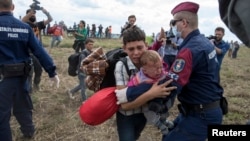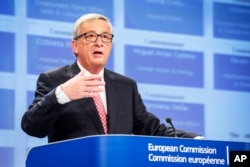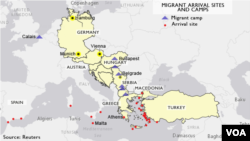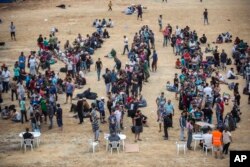European Commission chief Jean-Claude Juncker is calling for an expanded country-by-country migrant quota plan throughout much of Europe, to accept thousands of asylum-seekers from the Mideast over the next two years.
The plan could cover as many as 160,000 refugees, with Germany, France and Spain taking the most, followed by Poland, the Netherlands, Romania, Belgium and Sweden.
As Europe faces its biggest stream of migrants since World War II, Juncker is set to unveil details of his proposal Wednesday at the European Parliament. But the quota idea is controversial and adamantly opposed by Hungary and some other European Union states.
The adoption of quotas is uncertain, with European leaders already rejecting a proposal in June that covered just 40,000 refugees.
The new distribution of asylum-seekers would be based on a country's economic output, population, unemployment rate and the number of refugees each nation had already agreed to accept.
Chancellor Angela Merkel in Germany, where refugees have been welcomed with food, water and toys for children, called Juncker's plan "a first important step."
Merkel said an EU requirement calling for asylum-seekers to first be processed in the EU port in which they arrive "no longer works," because it means Italy and Greece are handling the bulk of the influx streaming from the Mideast and Africa.
European Council President Donald Tusk, meeting with Israeli President Reuven Rivlin in Jerusalem Tuesday, said the massive influx of refugees to Europe is a sign of more to come.
"We are fully aware that this huge crisis is not an incident, this is something like a beginning of [an] exodus and this is why we have to do everything we can, and of course together," Rusk said.
'Not enough'
A key United Nations migration official, Peter Sutherland, said Tuesday it is "not enough" for the United States and wealthy Persian Gulf states to donate money to help refugees escaping the Syrian conflict and refugee camps in neighboring countries.
Sutherland said wealthier countries need to take in the asylum-seekers as well. "Buying your way out of this is not satisfactory," he said.
"Proximity doesn't count, capacity does count, and I do say that taking refugees is separate from giving money," Sutherland said, adding that Lebanon, Jordan and Turkey have taken in about 4 million Syrian refugees.
Sutherland said the migrant crisis happening in Europe must be handled similarly to the international response to the 1956 Hungarian revolution and the Vietnamese boat people crisis of the 1970s.
On both occasions, he said, there was a global acceptance of responsibility.
The U.N. said Secretary-General Ban Ki-Moon has called the heads of seven European governments in the last two days and stressed that the large majority of migrants are fleeing war and violence in their homelands and have a right to seek asylum.
Peter Boogaard, a spokesman for the National Security Council, said the United States is in contact with countries in the Middle East and Europe grappling with the influx of more than 340,000 people from the Middle East, Africa and Asia.
Billions in aid
The U.S. has provided over $4 billion in humanitarian assistance since the Syrian crisis began, and over $1 billion in assistance this year, Boogaard said.
The Obama administration said it is “actively considering” ways to be more responsive to the global migrant crisis, including refugee resettlement.
Germany said it expects 800,000 refugees this year. Vice Chancellor Sigmar Gabriel said his country could accommodate a half million refugees annually for several years.
One Syrian refugee, Mohammed Dahha, said he wants to reach Sweden and is looking for a peaceful land.
"The people, they are moving from country to another country, from Asia to Europe, to get rest there, OK? To be under peace," he said. "They're looking for peace, because you cannot live without peace."
As refugees from Syria and other war-torn nations make their way from Hungary to Germany and other western European destinations, thousands more are stuck in Greece and Macedonia, with no idea when they can move on.
The United Nations refugee agency says about 30,000 migrants have arrived in Greece, including 15,000 to 18,000 on the island of Lesbos alone, while 7,000 Syrian refugees have arrived in the former Yugoslav republic of Macedonia.
The migrants are waiting to be screened before they are allowed to head on to seek asylum.
Interim Interior Minister Yiannis Mouzalas was quoted by Agence France Presse, telling a local radio station that the situation on Lesbo is "on the verge of explosion."
Smuggling charges
Meanwhile, Swedish police said Tuesday they have detained 14 people in the past week accused of smuggling migrants across the Oresund bridge from Copenhagen, Denmark, to Malmo, Sweden.
It wasn't immediately clear whether the suspects were part of organized smuggling networks or individuals who wanted to help migrants come to Sweden for humanitarian reasons.
While Sweden has become a top EU destination for refugees by issuing permanent residency to all Syrian asylum-seekers, Denmark has sought to reduce the influx by issuing temporary residence permits, delaying family reunifications and slashing benefits for newly arrived immigrants.
WATCH: Related video from Hungary-Serbia border by VOA's Luis Ramirez
Hungary on Tuesday began busing migrants and refugees to a nearby registration center, defusing some tensions at its southern border with Serbia.
The country, which has made frantic and confused efforts to control the huge tide of migrants transiting the country as they try to reach Germany, left many trapped for days outside the border village of Roszke.
On Tuesday, Prime Minister Viktor Orban announced fresh efforts to complete a fence to keep the refugees out.
Orban paid a snap visit to the border late Monday to check on progress, later telling the Magyar Idok online newspaper that he was convinced "the works in progress have to be sped up."
Kristof Gancs, a spokesman for Hungarian Interchurch Aid, a relief organization, said Monday, “Every day, thousands of people come across. Only today, it’s more than 2,000 people who have crossed this border line, which means they have entered the European Union."
Lisa Schlein contributed to this report from Paris. Some material for this report came from AP and Reuters.











